Revolutionary Love
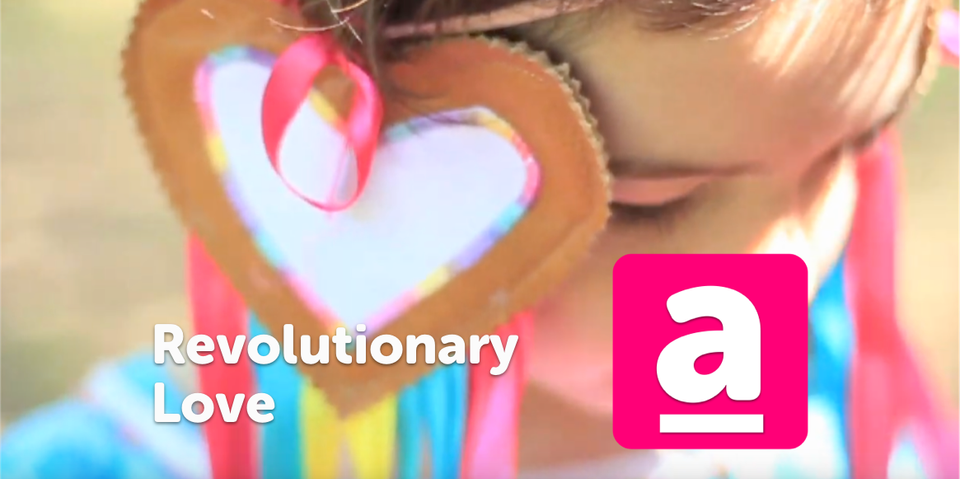
by Eli Parry, the RYSE
THIS WAS THE CENTRAL QUESTION of the Revolutionary Love session which was held in February at the Trinity Rooms. We felt that a question such as this could be fittingly answered when set over the capitalist co-opted day of celebration in the name of St Valentine.
If we begin to consider love as inherently revolutionary, an urge for resistance arises in the face of the restrictive world we live in, where freedoms are oppressively constrained by the forces of imperialism and capitalism, tyranny and exploitation.
What restraints are we facing then: the capital-imperialist powers that savage the natural world and the freedoms of its peoples, and being forcibly divided, dominated and diminished by class, racism and sexism and other systems of violent control.
We can see this in our local setting as we are dictated to by the everyday acceptance that the world is as it is — a violence in situ — and that our love for each other is discouraged from reaching beyond the immediate family unit or that it even should not go beyond us as islanded individuals alone.
There needs to be a change of face in abandoning this to ultimately embrace radical forms of empathy and sympathy.
Not all is so meagre and depressive however, as we can love in ways that brings us back into harmony from these desperate adversities.
What is Love?
WE BEGAN THE SESSION with sticky notes and this question.
This prompted us to explore the question of what revolutionary love feels like, and in feeling it, what does it do to us, or what do we want to do as a consequence of it.
The hope was for us to ground ourselves in our immediate understandings of love and that those understandings could be built upon as the session progressed with some warm and fuzzy feelings as well as some electrifying roaring fires.
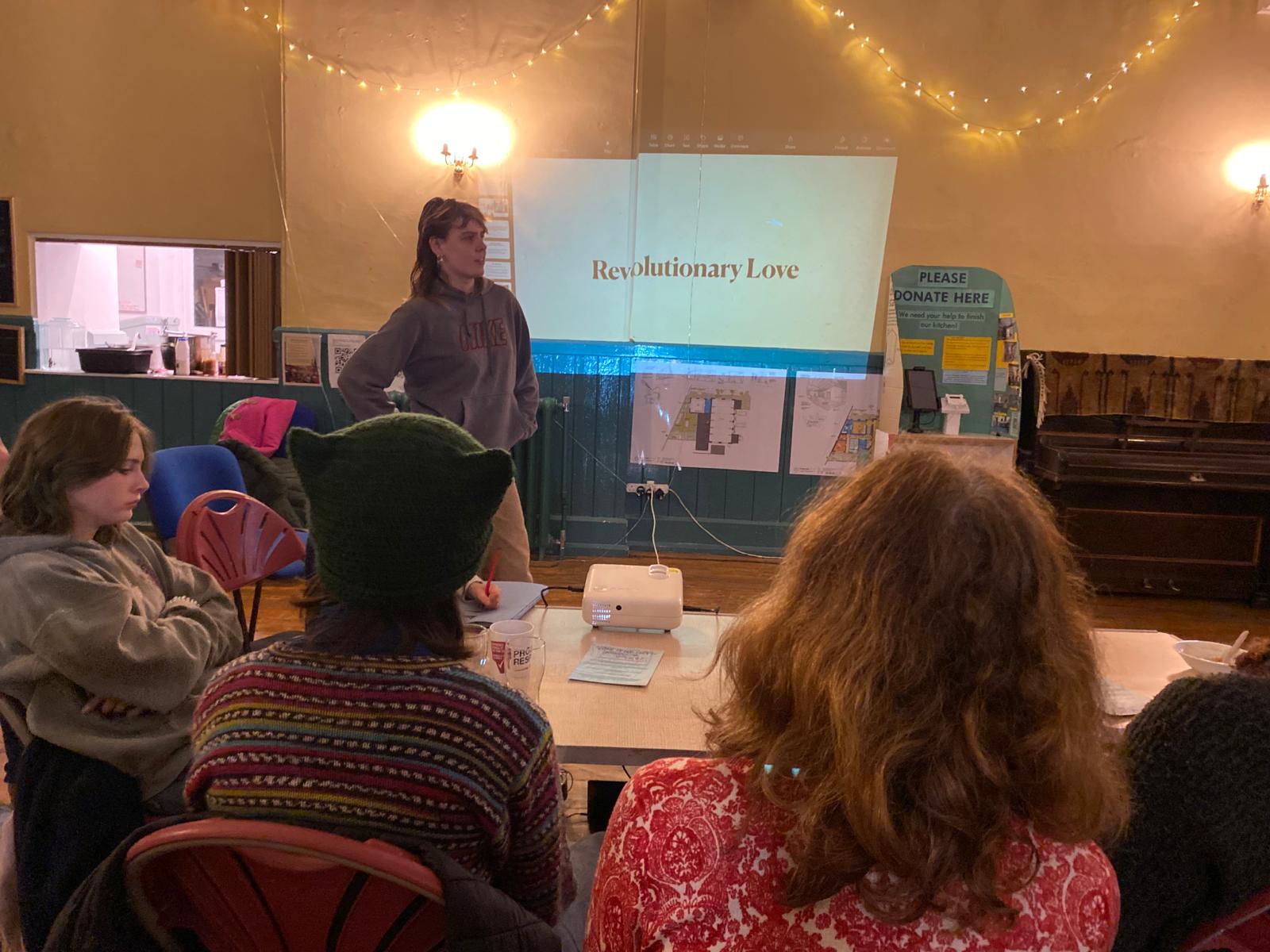
Why Revolutionary Love and Why now?
The current loving mode of the status quo, that prescribes us routinised and consumable practices, makes us inert to fighting against the established restraints that seek to sabotage our true desires.
The status quo dictates to us what behaving lovingly entails, preventing us from questioning if this is how we want it to be. We go out for dinner, a drink, to the theatre, the cinema: “save love for the weekends and make me more money you silly romantic!” demands your boss and the illusive entertainment mogul.
Instead of fulfilling our daily working obligations — and indulging in those commercial acts that maintain the pursuits of elite stakeholders in political capital — we can re-moralise love away from the vapid aspirations for the sustainment of business-as-usual formal loving structures.
This disingenuousness stamps out the smouldering fire of love, as we are raised to be agents of surveillance over our own burning emotional desires. Apparently we get too angry about “things that don’t affect us”, as if our love and empathy, passion and compassion, will steer us awry..
The lover is taught that their love cannot breach the bounds of imperial complicity, as though we do not have enough passion to support the battle of those who are enduring colonial powers in parallel to us.
We can hold each other with loving care as we strive for survival and act in resistance, despite oppressive governance.
Although it appears that we have had our love dispossessed, we still have the spirit to reclaim it.
And why shouldn’t the lover care and act in accordance? Aren’t there many, significant, events happening in the world today that deserve our attentive love?
This is not to devalue the importance of familial love and survival under capitalism, but that our love must become boundless and ungovernable.
Together, we can learn extensive ways of loving that do not serve elite interests, rather in ways that serve us to take action against the interests of those that profess to rule over us and to regain sovereignty over our own hearts.
Love for our global family, and our knowledge that love is centred in a relational force for solidarity and empathy, is not as misguided, innocent, or naive, as those that maintain the power imbalances would like to lead us to believe.
“If they cannot love and resist at the same time, they will probably not survive”
Audrey Lorde
WE BROUGHT THE SESSION into the first source that encouraged curiosity to love in relation to anti-oppression, anti-imperialism, and storytelling.
A short film (consisting of dance and spoken word) follows a young black woman as she disentangles ancestral history, the violence her community faces now, and the possibilities for innovating positive futures. A Revolution of Love (2021), choreographed by the impressive creative force of Esie Mensah, is set under the voice of Assata Shakur, a former Black Panther, whereby she calls for collectivity in striving for survival, and an end to colonialism and its many facets under governments of the Global North.
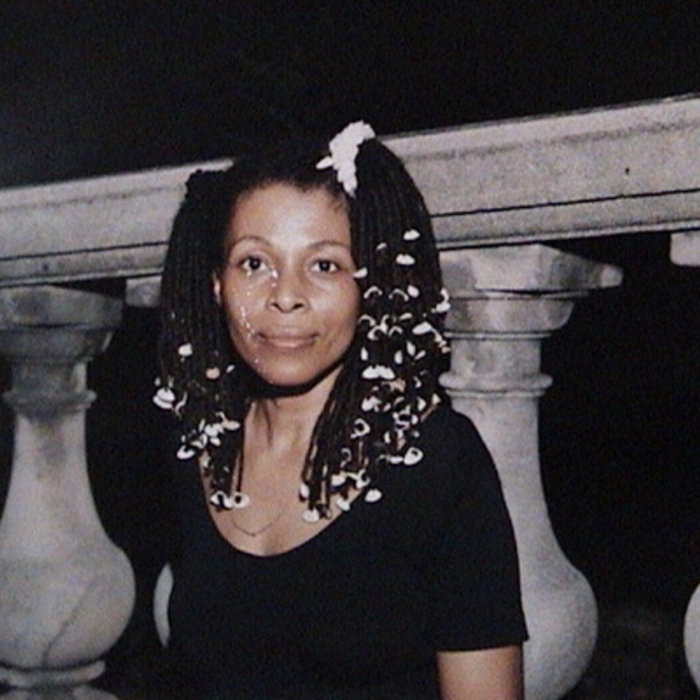
"A Revolution of Love" — Esie Mensah
Her spoken word is presented as a revolutionary love that speaks to expanding love to nonhuman animals, lands and earthly elements, which in turn aims to curate a cultural respect that will allow us to be loving in an uprising of majesty.
It is this imposition of rage, compassion, and the hunger for change towards a new loving reality for us all that we can be driven by in order to overthrow imperialism and neo-colonialism as we see it today.
Love makes it possible for us to conjure the future anew through the directive of passionate action, allowing ourselves to feel the burning impulses of our love for one another, our planet, nonhuman animals, our past loved ones (ancestors), and our lands. If we cannot do that, we are passive at best, unsympathetic and lackadaisical, or even cruel at worst. As our next source, from writer and activist James Baldwin posits it:
“if you cannot love anybody, you are dangerous… you have no way of learning that other people suffer, no way of learning how to use your suffering, and theirs”
— Interview (1987)
James Baldwin pioneered as a vital literary voice during the era of civil rights activism in the 1950/60s, he was an ardent supporter of civil disobedience and continues to have a profound influence and legacy.
Through his words, he encourages the way that we can be love, embodying it as an overarching understanding of each others’ suffering with dignified common respect. Likewise, he illustrates the emboldened way that the passions of the lover can be channelled as an enraged menace in rejecting any master:
“i use the word ‘love’ here not merely in the personal sense but as a state of being, or a state of grace… in the tough and universal sense of quest and daring growth”
— James Baldwin, The Fire Next Time (1963)
We can navigate the world’s violences together to reconcile our traumas (or “suffering” as Baldwin puts it: the effect of violence on our collective minds and bodies) towards freedom.
We must have faith and strive to learn to be loving to disastrously ravage colonialism and power imbalances, violences that have become enforced onto everyday life as we know it. We can be communities that refute this normalcy and be actors of a love that necessarily entails justice and growth, repair and reconnection.
The final source we presented was from Leanne Betasamosake Simpson who builds upon love as a catalyst for resilience in holding and repairing intergenerational colonial trauma.
Simpson is an innovating contemporary writer and activist whose debut work Islands of Decolonial Love (2013) is a semi-biographical fiction exploring the lives of indigenous folk and communities, especially those of her own Nishnaabeg nation.

Leanne Betasamosake Simpson's website
An excerpt story of Simpson’s Islands of Decolonial Love, titled leaks, was presented as a source in the session on the vitality of indigenous languages in communicating resistance epistemologies, alongside the conflicts in trying to break colonial trauma cycles: decentralising Western perspectives in order to decolonise love.
At its centre, this involved grappling with the yearning for a loving life whilst endeavouring to resolve the persistent brutality of colonialism.
In reframing this history of violence, her work promotes voices that are little heard in the mainstream in a profound, beautiful prose, song and poetic lullaby.
“for every one of your questions there is a story hidden in the skin of the forest. use them as flint, fodder, love songs, medicine. you are from a place of unflinching power, the holder of our stories, the one who speaks up”
— leaks, in Islands of Decolonial Love (2013)
This cultural resilience impassions the healing relations between land, peoples and the environment from the trauma of continuing imperial intervention — including observable and explicit social injustices, dominion over land, and extraction colonialism.
Simpson’s activism here recovers cognitive justice through storytellings of ancestry and the necessity of hope in resisting imperialism. Her work enmeshes the promotion of individual and collective experiences that must relieve the load of colonialism towards new loving realities. Love can thus be a practice of interconnected liberation, as bell hooks illuminates upon:
“the moment we choose love, we begin to move against domination, move towards freedom to act in a way to liberate… this action is the testimony of love as a practice of freedom”
— Outlaw Culture: Resisting Representations (1994)
bell hooks and John Powell: Belonging through Connection
Through the presentation of these sources we sought to build on appreciation of revolutionary love as an act of internationalist solidarity, a movement for change and liberation of all peoples.
What does Revolutionary Love feel like?
We split into breakout groups that focused on one source each, to curiously inquire into what revolutionary love feels like emotionally, and in embracing it, what it brings up for us in our movement of resisting domination and the inequitable status quo.
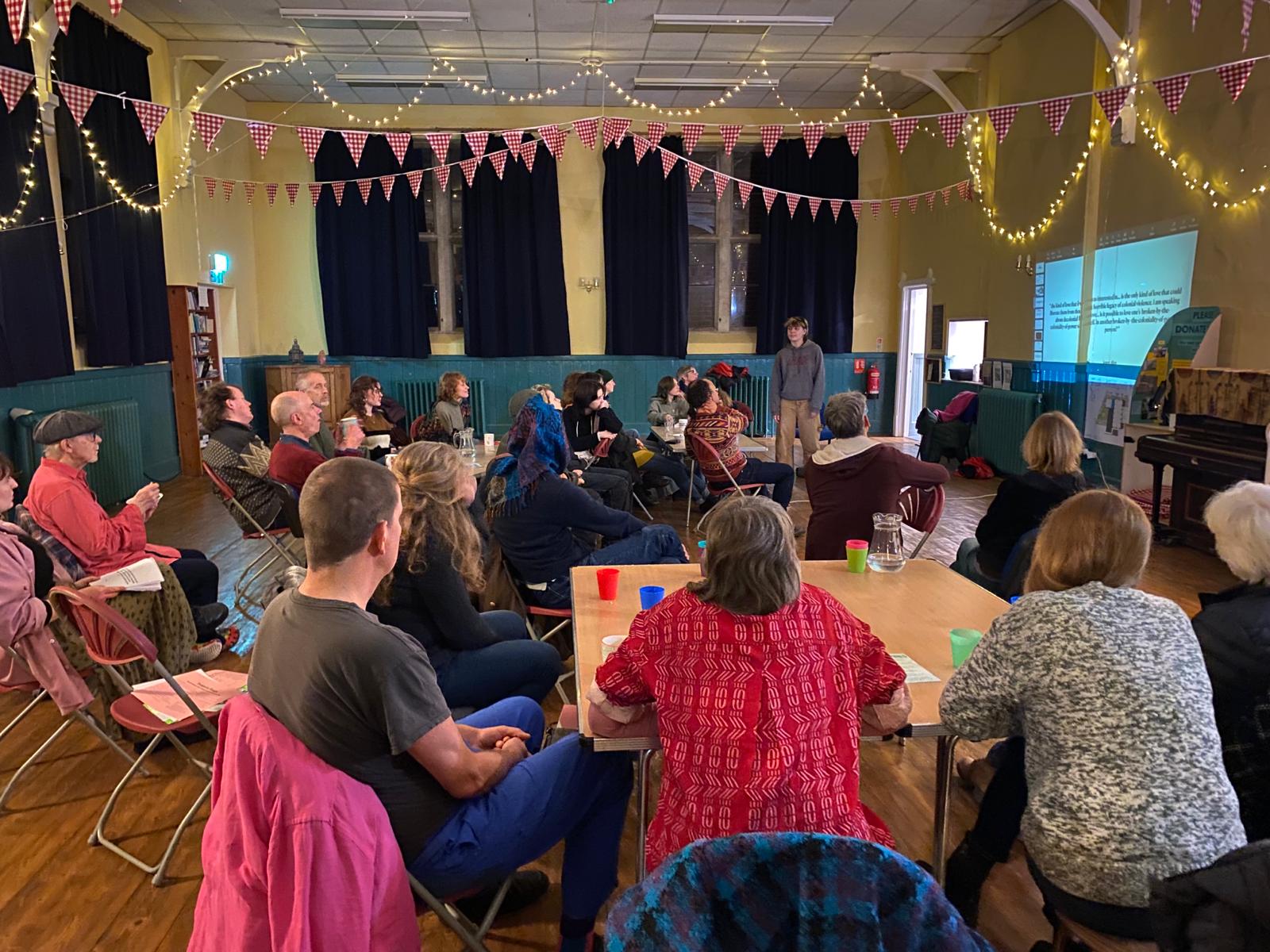
The groups came back together to contribute to a working definition that summarised our responses and articulated our reactions from the session.
We saw the following feelings emerge:
● In having a sense of vulnerability in bringing love courageously out of ourselves we are able to learn from ourselves and others around us.
● Existing in a loving state of being is a rebellion and a defiance: love is a call to action.
Having unconditional love, empathy for a one-people (or an all-people), is a togetherness that specifically must be an anti-racist practice.
● Love as a higher power that we can engage with collectively, is a medium through which we can begin to entrust faith in the future.
● Creating a radical ethics of care means including and extending love to the earth and a unity of body and mind.
We are able to use these reflections as a working definition from this session, not to be said that this is the exhaustive list or summary of takeaways from any discussion on love.
The core of a working definition is that, like our perspectives and lives (and thus our movements), they must always be evolving, as we encounter different contributors, relationships and experiences.
This can support us in beginning to move towards being lovers of all aspects of Mother Earth and ourselves, together, connected, to heal in a way that necessitates recreating the futures we imagine.
Eli writes on behalf of The RYSE (Radical Youth Space for Educations)






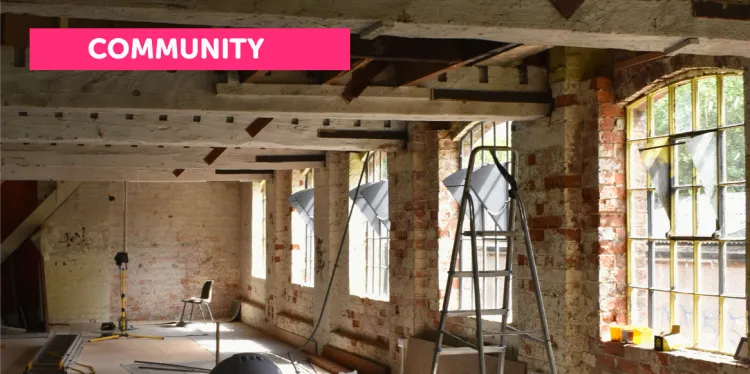
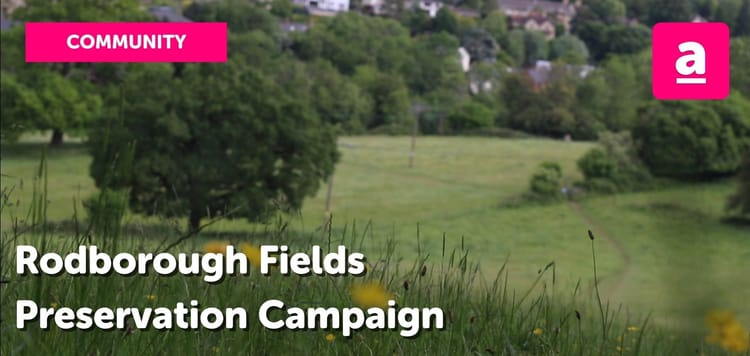

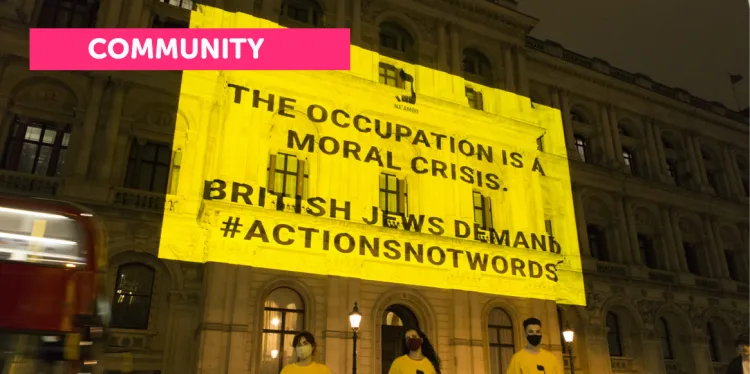
Member discussion